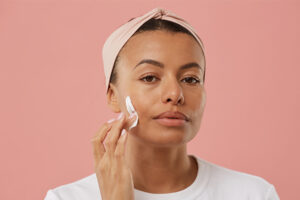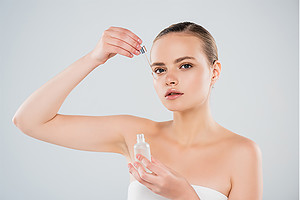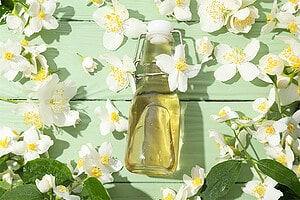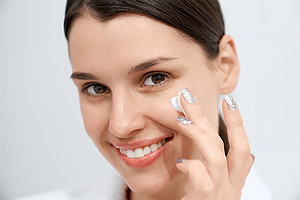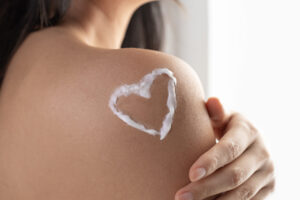There’s a familiar saying that goes “you will age with grace when you get older.” Sadly, that’s not the case for those with sensitive skin as it easily gets affected by both internal and external factors and is prone to breakouts, rashes, and ultimately skin aging.
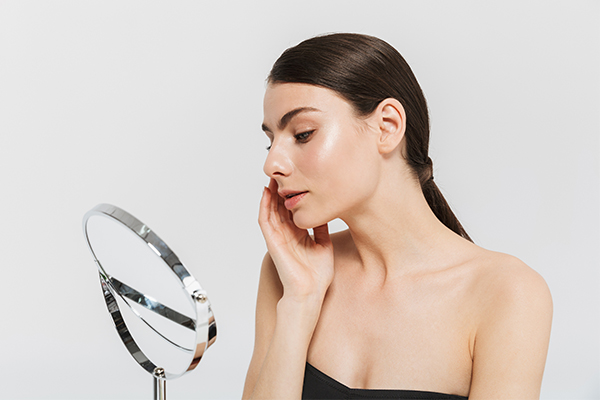
You can have sensitive and acne-prone skin or sensitive and dry skin. This type of skin is reactive to the environment, such as the sun, cold, and dangerous substances, and the effects can be seen in the form of itching, stinging, sharp pain, thickening, or dryness of the skin. (1)
Both internal and external factors contribute to skin aging. External causes include air pollution, smoking, poor nutrition, and sun exposure, which results in coarse wrinkles, loss of skin elasticity, laxity of the skin, and a rough skin texture. Long-term exposure to sun ultraviolet (UV) radiation is the primary cause of extrinsic skin aging, referred to as photoaging. (2)
Furthermore, sensitive skin is more prone to redness, swelling, and dryness, so it is less tolerant to frequent and prolonged cosmetic use. (3) If proper care is not taken, sensitive skin will age faster and will appear older than it is. Sensitive skin is prone to early skin damage and, thus, aging-related changes. (4)
Keep reading for more information on why sensitive skin leads to faster skin aging.
Article Contents
Why Does Sensitive Skin Age Faster Than Normal Skin: A Scientific Explanation?
1. Skin inflammation may accelerate the aging of sensitive skin
Sensitive skin is more prone to dryness, redness, swelling, and itching, which are signs of skin inflammation issues. (5)
According to a 2014 research study, skin aging is associated with inflammation and is observed in various skin diseases. However, its role in skin aging has yet to be clarified. (6)
2. Genetic and environmental factors both contribute to age-related issues, which are more prevalent in people with sensitive skin
Skin aging is a complex process influenced by genetic and environmental factors.
Recent twin studies have revealed that genetic factors account for up to 60% of skin aging variation between individuals, with nongenetic factors accounting for the remaining 40%. (7) Genetic and environmental factors influence specific biochemical properties, which are ultimately responsible for progressive skin decay. (7)
One of the most important environmental factors is oxidative stress, (8) which causes age-related changes in the skin, resulting in age spots, redness, itchiness, lack of elasticity, and decreased hydration. (7)
And sensitive skin when subjected to harsh environmental factors such as increased UV exposure or harmful chemicals renders the skin more vulnerable to damage.
The use of chemicals and some types of soap may aggravate the condition, causing the skin to lose elasticity and firmness due to decreased dehydration and inflammation. This leads to aging of the skin at a faster rate than normal skin.
3. Stress, an unhealthy diet, and dehydration contribute to faster aging of sensitive skin
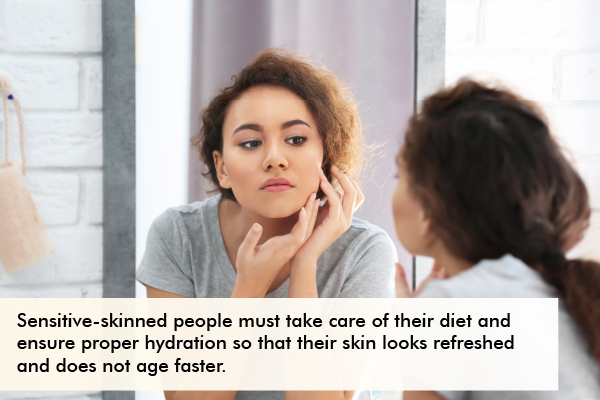
Itching, stinging, burning, and pain from sensitive skin can cause sleep disturbances, fatigue, stress, and anxiety, (9) which cause aging.
According to one study published in 2021, a lack of sleep causes faster skin aging. Individuals suffering from sleep deprivation exhibit fine wrinkling. (10) In addition, skin fatigue hastens age and impairs the skin’s ability to repair itself.
Stress, dehydration, and an unhealthy diet can all make your skin “look tired,” dry, and dull, as seen in sensitive skin. Thus, sensitive-skinned people must take care of their diet and ensure proper hydration so that their skin looks refreshed and does not age faster.
What Are the Signs and Symptoms of Sensitive, Aging Skin?
- Redness
- Dry and rough skin texture
- Wrinkles and fine lines
- Skin feeling tight
- Higher sensitivity to external factors
The skin on the face is fragile and sensitive, making it more vulnerable to damage and irritation from outside elements. Natural, unavoidable aging processes reduce the ability of the skin to regulate moisture, regenerate, and protect itself.
How to Take Care of Sensitive Skin to Avoid Premature Aging
The sun contributes significantly to premature skin aging. Some habits can also cause sensitive skin to age faster than it would naturally.
Follow these measures to protect your skin from premature aging.
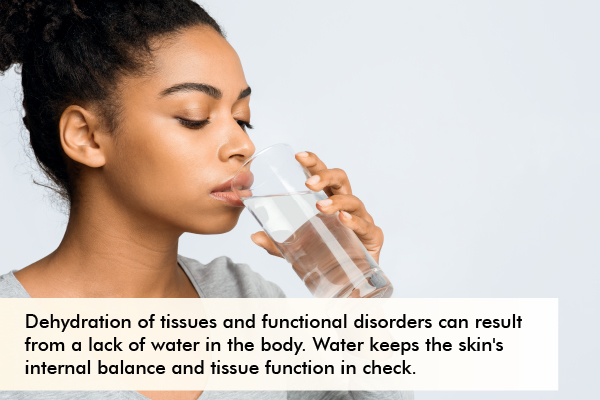
1. Maintain a healthy diet
Diet and balanced nutrition are important factors in delaying aging and extending life. A high-sugar diet, as well as eating barbecued and fried foods, hastens skin aging.
Avoid skin aging by eating foods high in iron, iodine, zinc, copper, and selenium. (11)
2. Drink plenty of water
Dehydration of the tissues and functional disorders can result from a lack of water in the body.
According to studies, consuming more water than 2 L of water per day significantly impacts skin physiology and promotes both superficial and deep hydration. Water keeps the skin’s internal balance and tissue function in check (e.g., aging and inflammation). (11)
3. Use sunscreen daily to protect your skin
Use broad-spectrum sunscreen with SPF 30 (or higher) to protect your skin from the harsh sun rays (12) when going out in the daytime.
Apply sunscreen daily to all exposed skin that is not covered by clothing. For better protection, look for clothing with an ultraviolet protection factor (UPF) label.
Moreover, you prematurely age your skin every time you tan. So, rather than getting a tan, use a self-tanner.
4. Stop smoking
Smoking speeds up the aging process of the skin. It causes wrinkles and a dull, sallow complexion.
5. Reduce your alcohol consumption
Regular consumption of alcohol dehydrates your body and that effect can be seen on the skin such as premature skin aging and aggravation of your already sensitive skin.
In addition to that, alcohol products are also abrasive to sensitive skin. It dehydrates the skin and, over time, damages it. This may make the skin appear older.
6. Apply a facial moisturizer every day
Moisturizers attract water to the skin, giving it a more youthful appearance. They are also beneficial to sensitive skin.
7. Do not apply stinging or burning skin care products
When your skin burns or stings after the application of a skin care product, the product may be irritating and unsuitable for your skin. The damage can lead to older-looking skin. (13)
Use herbal products that are suitable for your sensitive skin, such as moisturizers and toners containing aloe vera, (14) green tea, (15) and witch hazel. (16) These ingredients are suitable for sensitive skin and help to delay the onset of skin aging symptoms.
8. Exercise regularly
Most days of the week, you must exercise. A few studies have found that moderate exercise can improve circulation and boost the immune system. This can give the skin a more youthful appearance. (17)
9. Avoid stress
Stress causes chemical oxidative stress, which is associated with inflammation and causes accelerated skin aging. (18)
General Queries Related to Sensitive Skin and Skin Aging
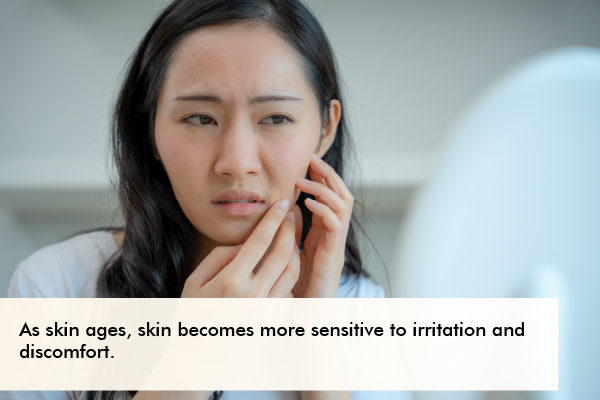
Is it true that the skin becomes more sensitive as age increases?
Yes. Researchers have found that, as skin ages, it becomes more sensitive to irritation and discomfort. (19)
Does male skin age faster than female skin?
Research has found that male skin has a different response profile to environmental insults (such as UV rays, heat, and stress) from female skin due to differences in cosmetic or dermatological product usage and underlying biological differences. (20)
As a result, male skin is more sensitive to environmental aggressors, remarkably ultraviolet light exposure, (7) which causes skin aging and even skin cancer. (20)
Final Word
Yes, sensitive skin ages faster and is more prone to damage than any other type of skin. Irritated or damaged sensitive skin manifests various symptoms, such as stinging, burning, itching, and redness, which can lead to wrinkles and fine lines, which is why sensitive skin ages faster.
Tomatoes, potatoes, and cucumbers help rejuvenate sensitive, aging skin, so add them to your meals regularly.
References
- Duarte I, Silveira JEPS, Hafner Mde FS, Toyota R, Pedroso DMM. Sensitive skin: Review of an ascending concept. Anais brasileiros de dermatologia. https://www.ncbi.nlm.nih.gov/pmc/articles/PMC5595600/. Published 2017.
- Zhang S, Duan E. Fighting against skin aging: The way from bench to bedside. Cell transplantation. https://www.ncbi.nlm.nih.gov/pmc/articles/PMC6047276/. Published May 2018.
- Spada F, Lui AH, Barnes TM. Use of formulations for sensitive skin improves the visible signs of aging, including wrinkle size and elasticity. Clinical, cosmetic and investigational dermatology. https://www.ncbi.nlm.nih.gov/pmc/articles/PMC6559254/. Published June 6, 2019.
- Skin aging handbook. Google Books. https://books.google.co.in/books?hl=en&lr=&id=YtXI1xXbKIsC&oi=fnd&pg=PT21&dq=does%2Bsensitive.
- Chen L, Zheng J. Does sensitive skin represent a skin condition or manifestations of other disorders? Journal of cosmetic dermatology. https://www.ncbi.nlm.nih.gov/pmc/articles/PMC8359429/. Published July 2021.
- Zhuang Y, Lyga J. Inflammaging in skin and other tissues – the roles of complement system and Macrophage. Inflammation & allergy drug targets. https://www.ncbi.nlm.nih.gov/pmc/articles/PMC4082166/. Published 2014.
- Naval J, Alonso V, Herranz MA. Genetic polymorphisms and skin aging: The identification of population genotypic groups holds potential for personalized treatments. Clinical, cosmetic and investigational dermatology. https://www.ncbi.nlm.nih.gov/pmc/articles/PMC4085290/. Published July 1, 2014.
- Kim ME, Kim DH, Lee JS. Transcription factors as targets of natural compounds in age-related diseases and cancer: Potential therapeutic applications. International journal of molecular sciences. https://www.ncbi.nlm.nih.gov/pmc/articles/PMC9696520/. Published November 10, 2022.
- Farage MA. Psychological aspects of sensitive skin: A vicious cycle. MDPI. https://www.mdpi.com/2079-9284/9/4/78. Published July 29, 2022.
- Nowowiejska J, Baran A, Flisiak I. Mutual relationship between sleep disorders, quality of life and psychosocial aspects in patients with psoriasis. Frontiers in psychiatry. https://www.ncbi.nlm.nih.gov/pmc/articles/PMC8290261/. Published July 6, 2021.
- Cao C, Xiao Z, Wu Y, Ge C. Diet and skin aging-from the perspective of Food Nutrition. Nutrients. https://www.ncbi.nlm.nih.gov/pmc/articles/PMC7146365/. Published March 24, 2020.
- Latha MS, Martis J, Shobha V, et al. Sunscreening Agents: A Review. The Journal of clinical and aesthetic dermatology. https://www.ncbi.nlm.nih.gov/pmc/articles/PMC3543289/. Published January 2013.
- 11 ways to reduce premature skin aging. American Academy of Dermatology. https://www.aad.org/public/everyday-care/skin-care-secrets/anti-aging/reduce-premature-aging-skin.
- Surjushe A, Vasani R, Saple DG. Aloe Vera: A short review. Indian journal of dermatology. https://www.ncbi.nlm.nih.gov/pmc/articles/PMC2763764/. Published 2008.
- Prasanth MI, Sivamaruthi BS, Chaiyasut C, Tencomnao T. A review of the role of green tea (camellia sinensis) in antiphotoaging, stress resistance, neuroprotection, and autophagy. Nutrients. https://www.ncbi.nlm.nih.gov/pmc/articles/PMC6412948/. Published February 23, 2019.
- Thring TS, Hili P, Naughton DP. Antioxidant and potential anti-inflammatory activity of extracts and formulations of white tea, Rose, and witch hazel on primary human dermal fibroblast cells. Journal of inflammation (London, England). https://www.ncbi.nlm.nih.gov/pmc/articles/PMC3214789/. Published October 13, 2011.
- Ryosuke O, Yoshie S, Hiromi A. The association between activity levels and skin moisturising function in adults. Dermatology reports. https://www.ncbi.nlm.nih.gov/pmc/articles/PMC8018252/. Published March 17, 2021.
- Yegorov YE, Poznyak AV, Nikiforov NG, Sobenin IA, Orekhov AN. The link between chronic stress and Accelerated Aging. Biomedicines. https://www.ncbi.nlm.nih.gov/pmc/articles/PMC7400286/. Published July 7, 2020.
- Perceptions of sensitive skin with age | request PDF – researchgate. https://www.researchgate.net/publication/312883376/.
- JE; O. Male skin care: Shaving and moisturization needs. Dermatologic therapy. https://pubmed.ncbi.nlm.nih.gov/22913441/.


